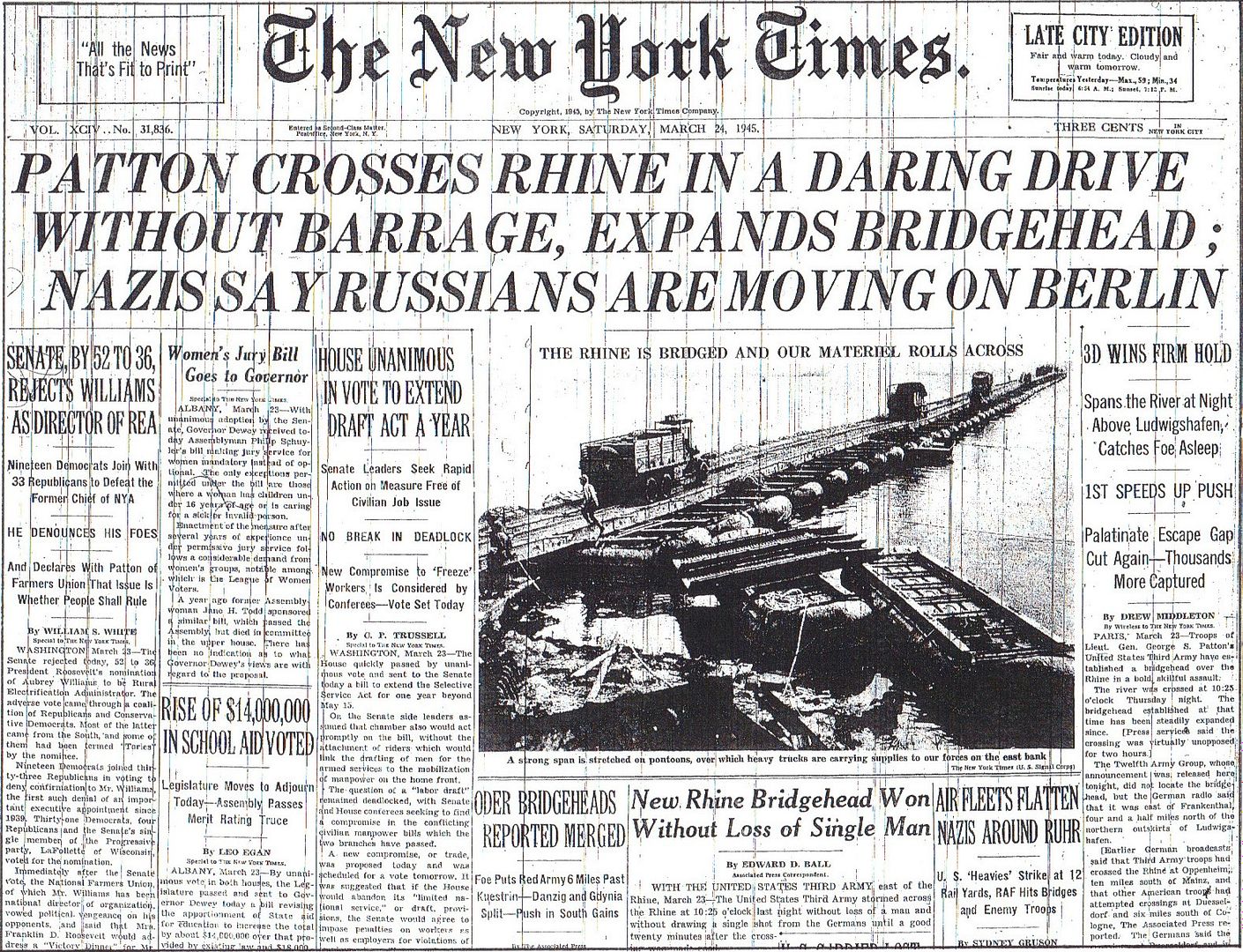
Posted on 03/24/2015 4:18:23 AM PDT by Homer_J_Simpson

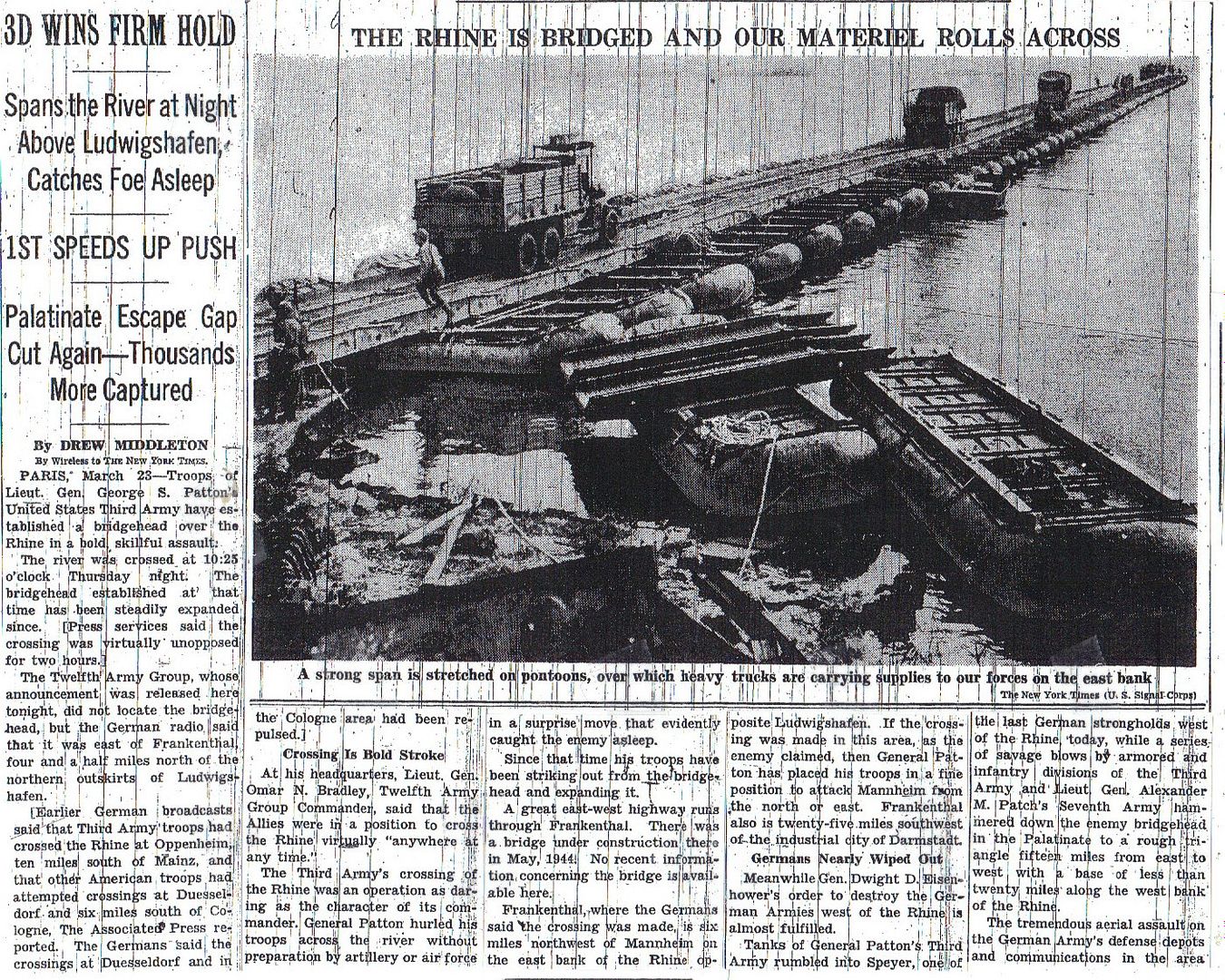
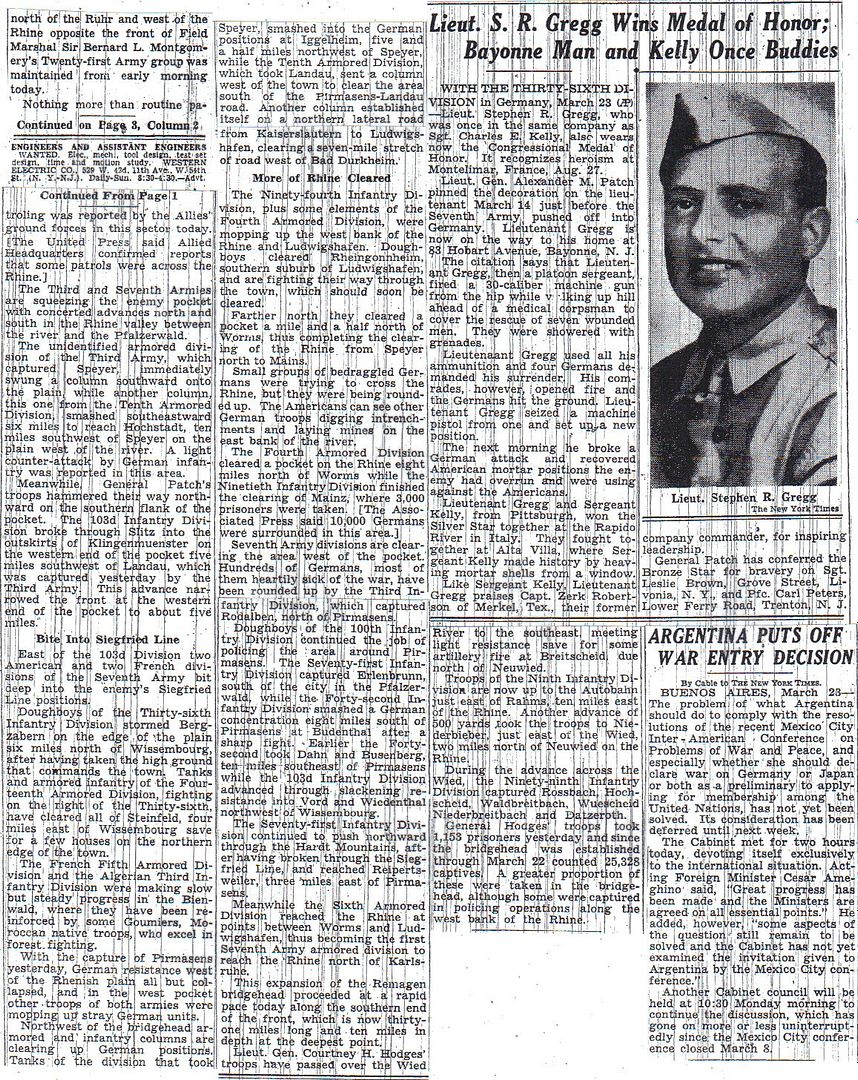
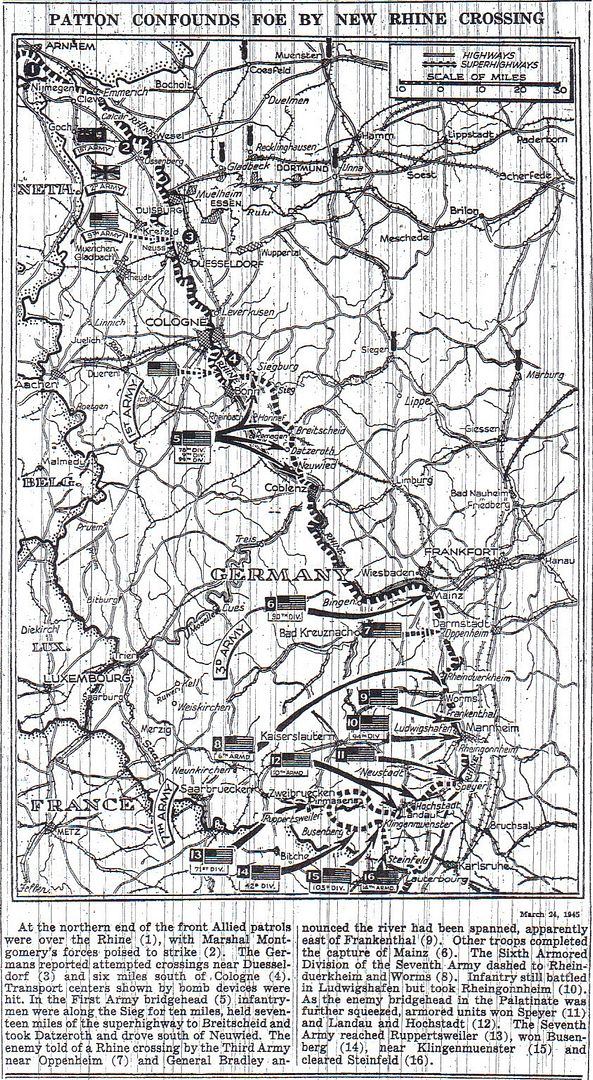
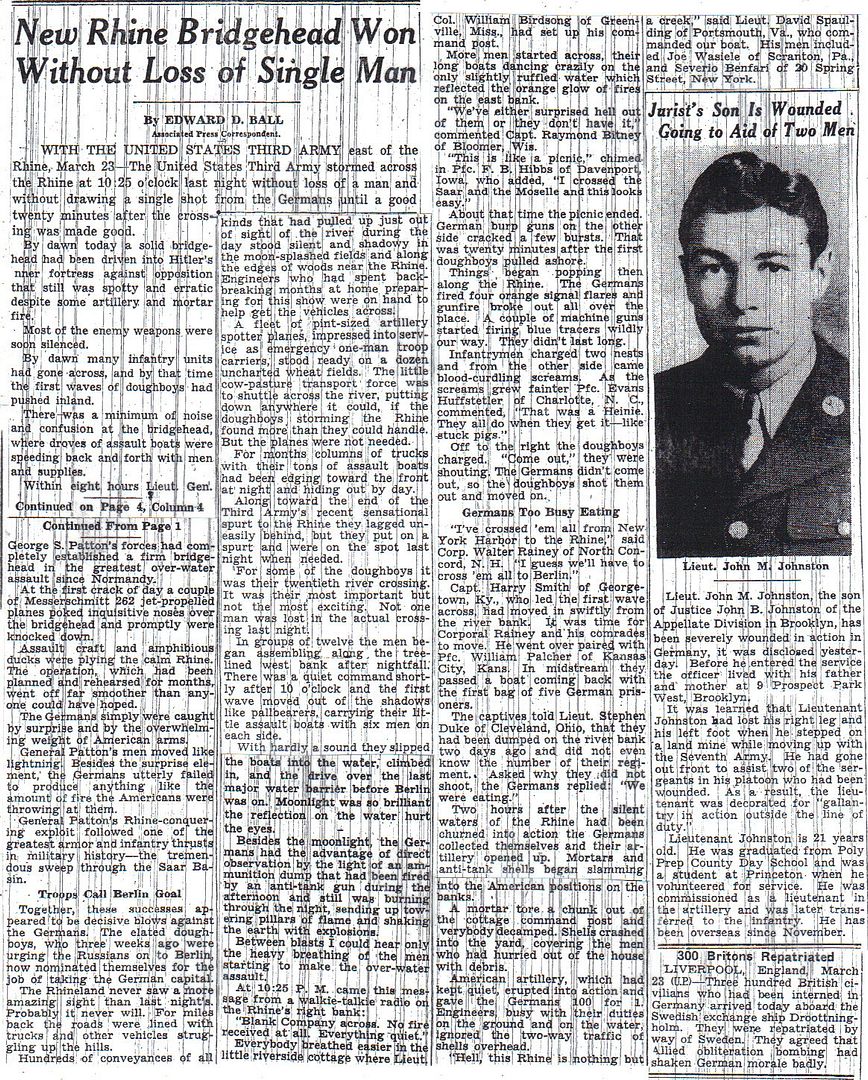
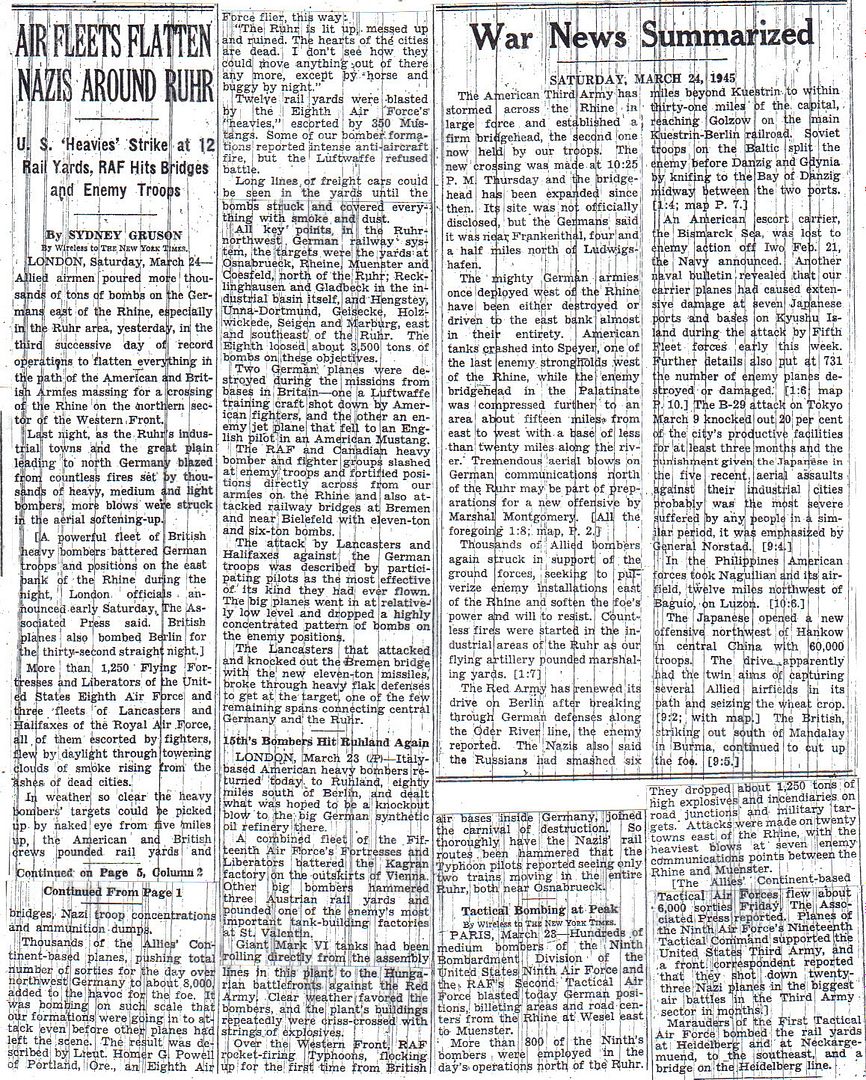
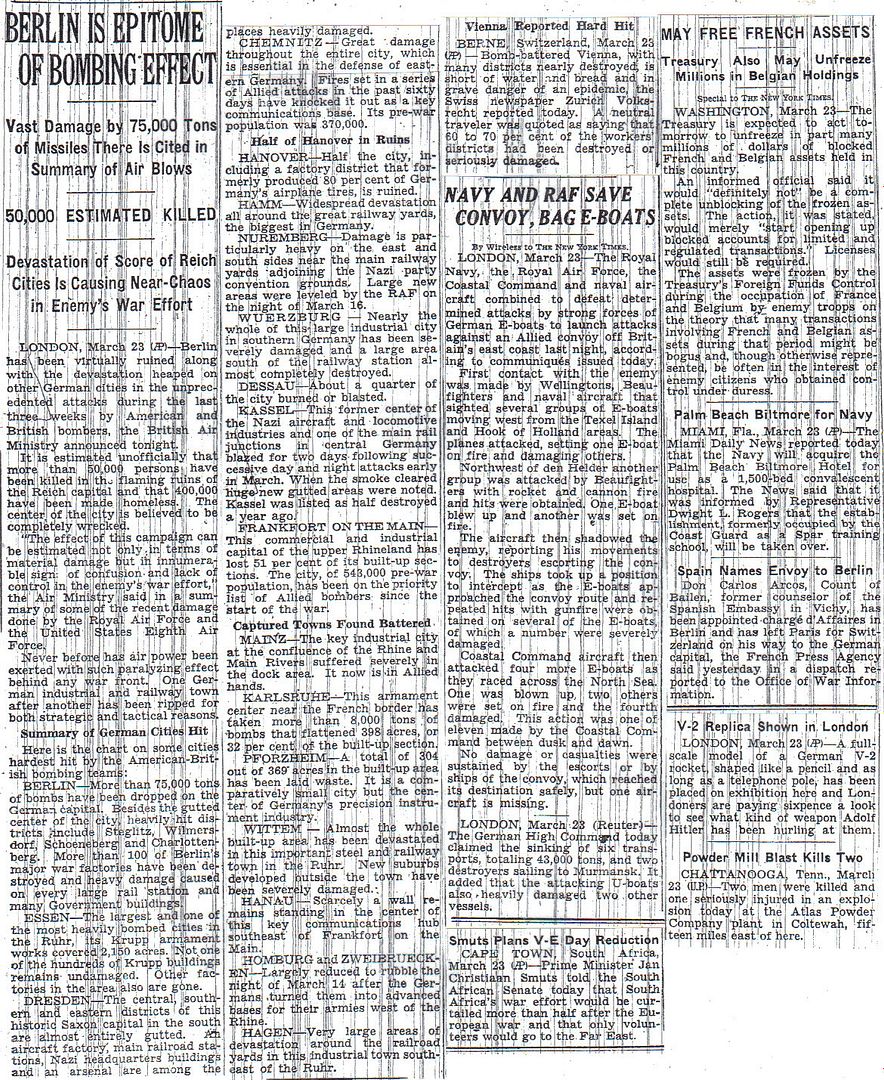
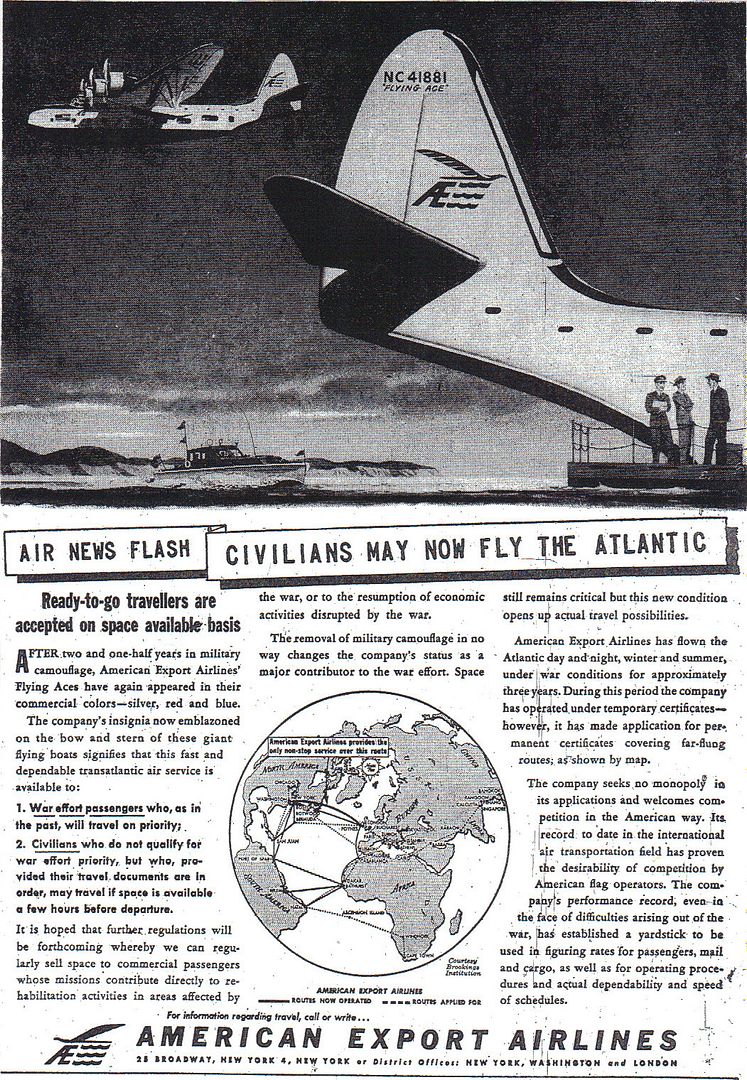
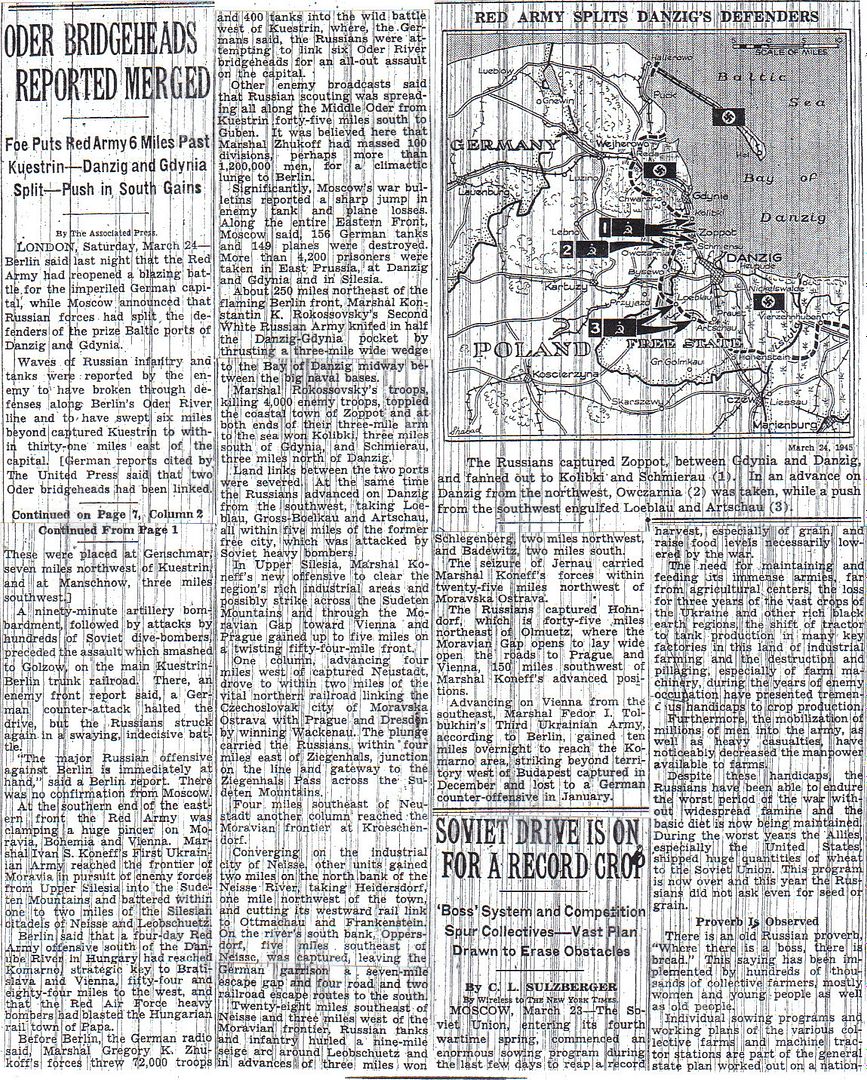
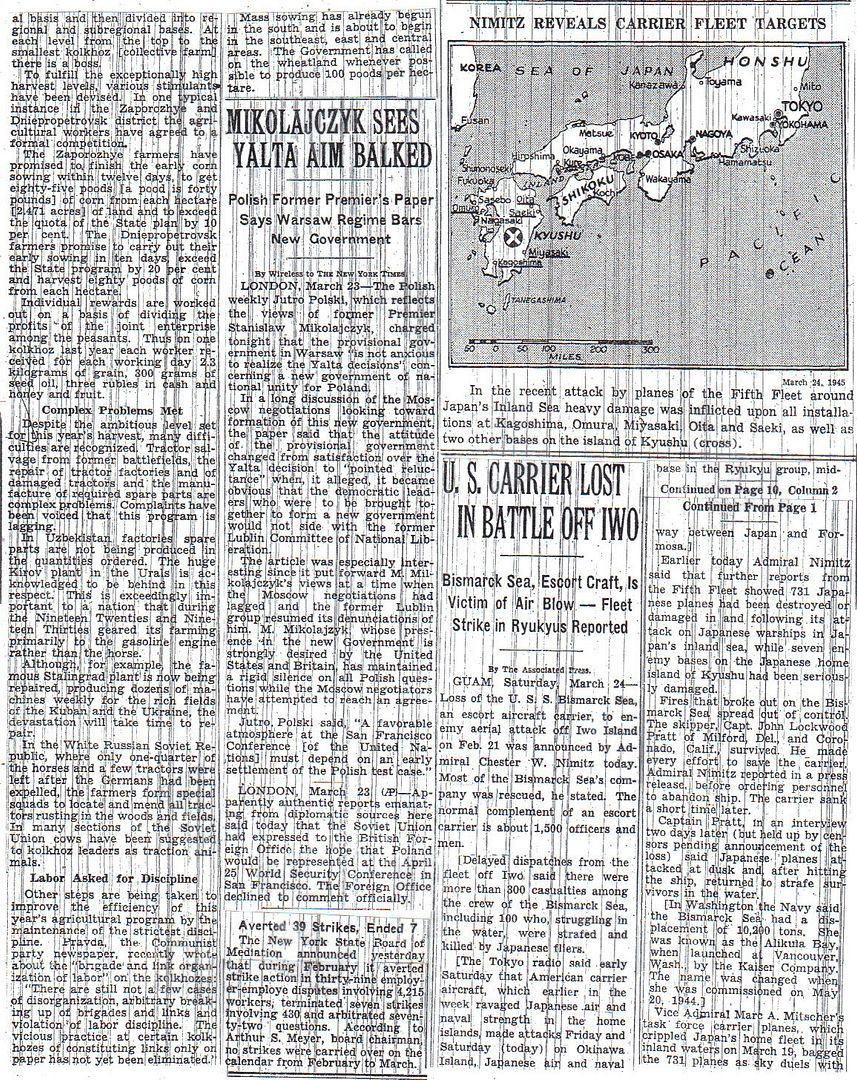
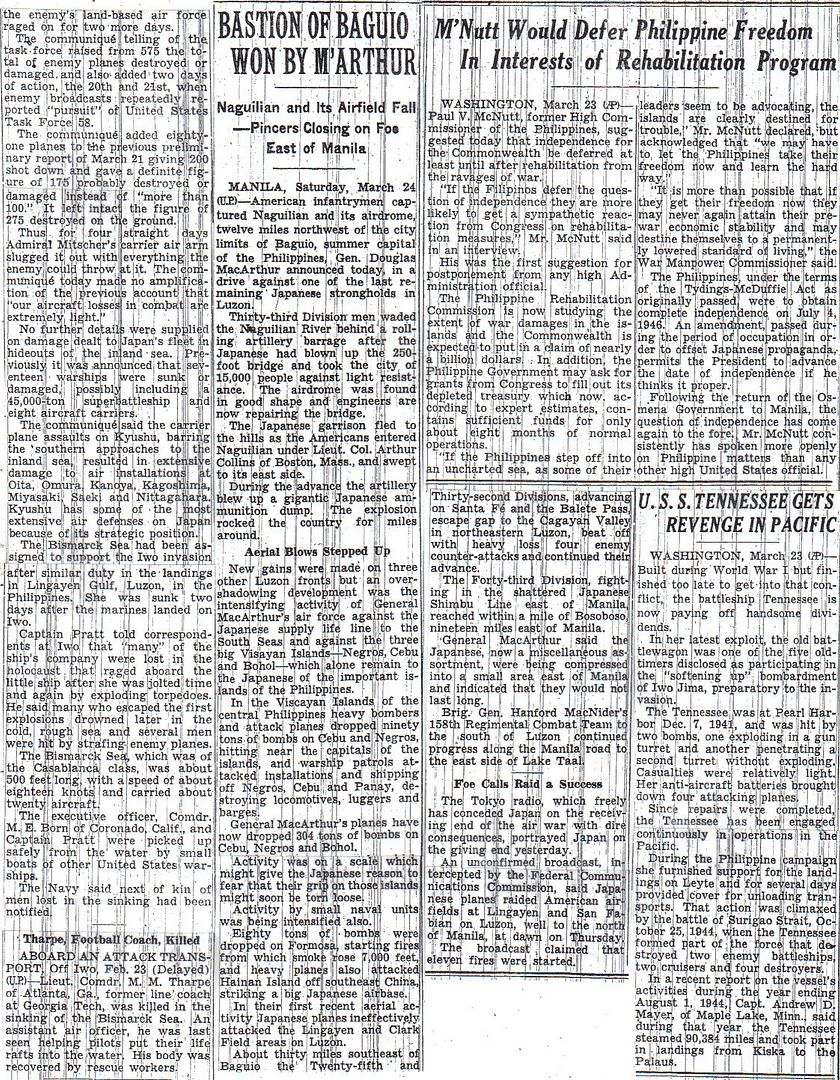
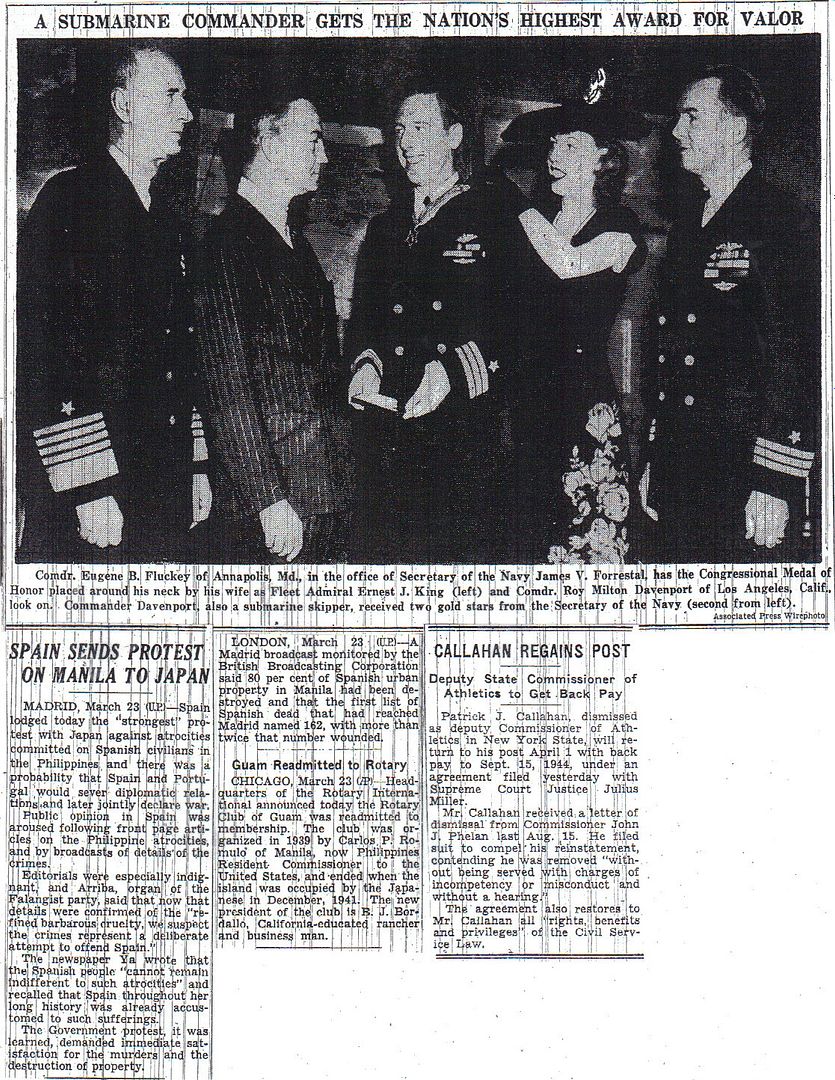
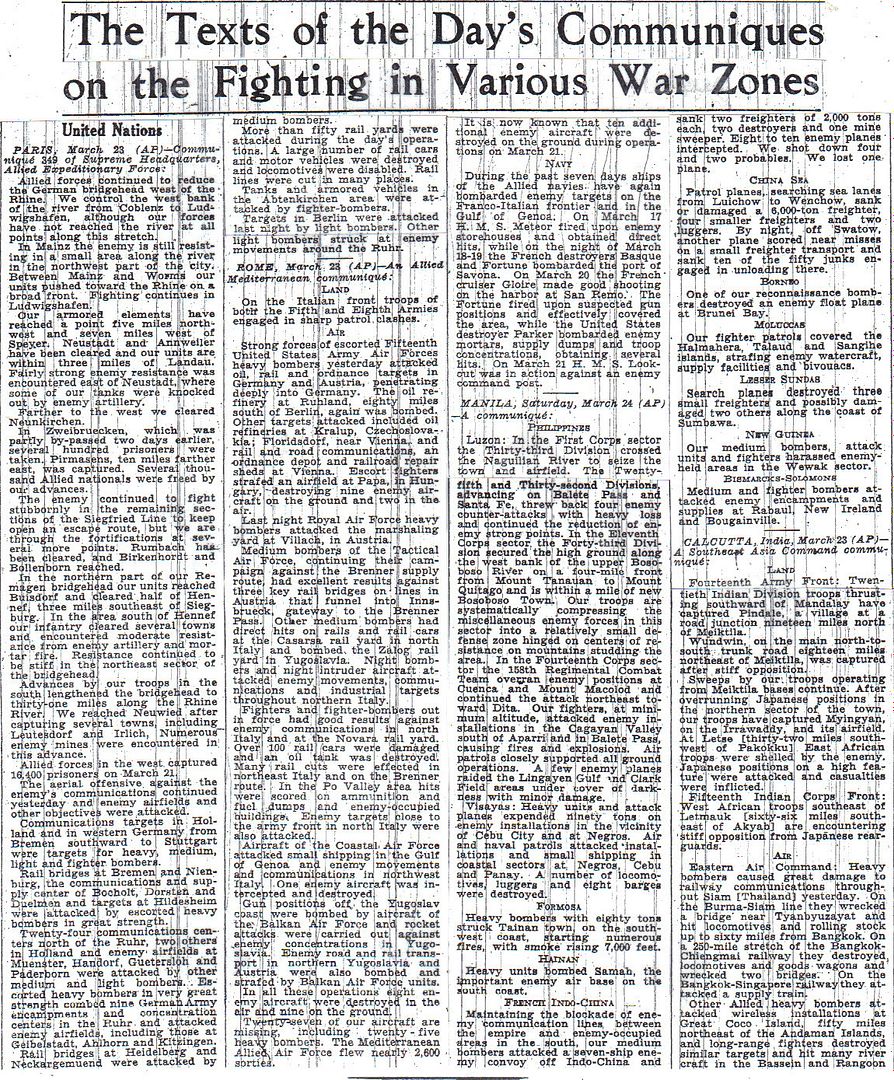
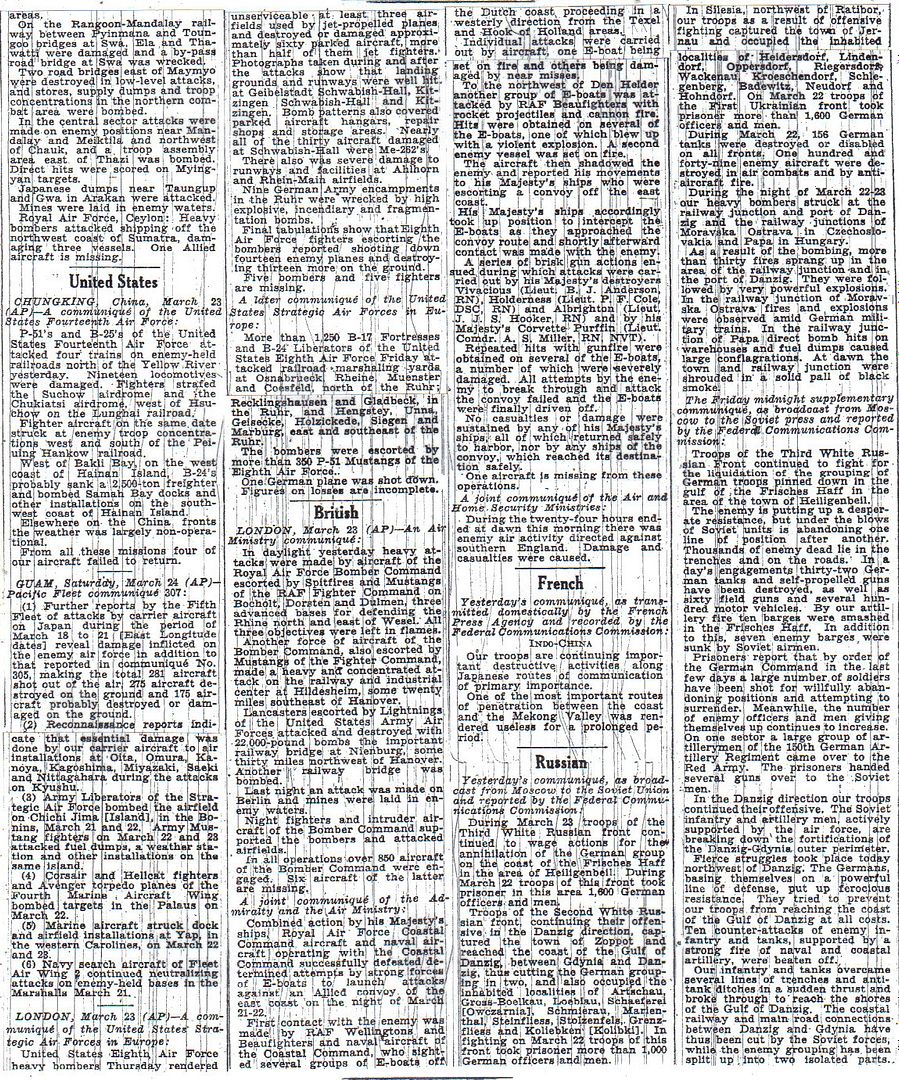
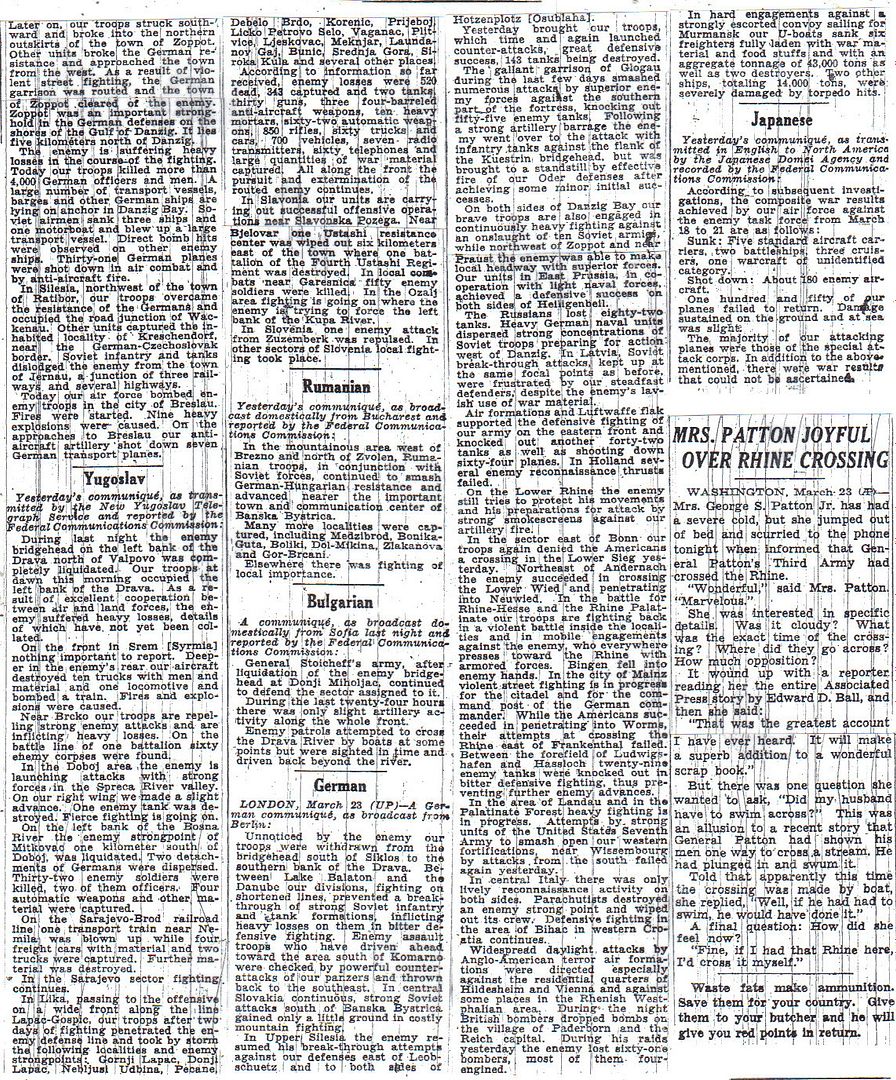
In the face of so astonishing a charge it seemed to me that silence was better than a contest in abuse, and on March 24 I minuted to Mr. Eden:
Prime Minister to Foreign Secretary 24 Mar 45
For the moment these negotiations have dropped. They may be reopened in a far more vital area than Italy. In this military and political questions will be intertwined. The Russians may have a legitimate fear of our doing a deal in the West to hold them well back in the East. On the whole it will be well to send no reply [to Molotov] till we have checked up with Washington to whom you should repeat the Russian message.
Winston S. Churchill, Triumph and Tragedy
Aboard a glider-towing aircraft (1:11)
Recounting the glider operation (3:43)
#1 - “Rum and Coca-Cola” - Andrews Sisters
#2 - “My Dreams are Getting Better All the Time” - Les Brown, with Doris Day
#3 - “Candy” - Johnny Mercer, with Jo Stafford and the Pied Pipers
#4 – “My Dreams are Getting Better All the Time” - Phil Moore Four
#5 - “I’m Beginning to See the Light” - Harry James, with Kitty Kallen
#6 - “A Little on the Lonely Side” - Frankie Carle, with Paul Allen
#7 – “Accentuate the Positive” - Johnny Mercer, with Pied Pipers
#8 – “Accentuate the Positive” – Bing Crosby, with the Andrews Sisters
#9 - “Dream” - Pied Pipers
#10 - “I’m Beginning to See the Light” - Duke Ellington, with Joya Sherrill
* From the article: “Thirty-third Division men waded the Naguilian River behind a rolling artillery barrage after the Japanese had blown up the 250-foot bridge and took the city of 15,000 people against light resistance.”
BroJoeK’s father is with the 33rd ID.
http://www.etherit.co.uk/month/2/24.htm
March 24th, 1945 (SATURDAY)
GERMANY: Montgomery’s crossing of the Rhine, meticulously prepared and impatiently awaited, is now under way, and in a message to his armies he says that they will soon be “chasing the enemy from pillar to post”. Over 100 miles to the south, Patton crossed the Rhine 24 hours ahead of Montgomery after boasting that he was not going to let the British field marshal “carry the ball”. he went across at Nierstein against light opposition and swept down on Darmstadt.
While Patton has captured the headlines, Montgomery’s operation, on a massive scale, has substantial strategic objectives; it is aimed at taking Allied forces in a deep thrust across the north German plain, while the US 9th Army seals off the Ruhr.
The assault force assembled behind a 20-mile long smokescreen. With 1,250,000 Britons, Canadians and Americans under him, Montgomery has more than 5,500 artillery pieces, anti-tanks guns and rockets. The British Second Army alone has 120,000 tons of ammunition, stores and other supplies above normal needs.
The British went across last night at Wesel; the town had been reduced to rubble by Allied bombing and shelling, but the Germans clung on for the best part of 24 hours. To the south, the US 9th crossed against patchy opposition. “There was no real fight,” a company commander said, “The artillery had done the job for us.” There were 31 American casualties.
This morning, in Operation Varsity, over 21,000 airborne infantry were dropped north-east of Wesel. They quickly overcame enemy resistance and linked up with the main force. Only on the extreme left wing, near Emmerich, is resistance really tough. “The enemy”, say the Canadians, “are fighting like madmen.” There are now three bridgeheads between Wesel in the north and Mainz in the south: Montgomery’s, Patton’s and the US First Army’s at Remagen. Operation Plunder under General Montgomery extends the bridgehead to a depth of 5 miles. The US 9th Army, now part of Montgomery’s 21st Army Group, begins to cross the Rhine south of the British and Canadians.
Starting at 1000 hours local, 2,029 IX Troop Carrier Command C-47s and gliders plus 839 RAF aircraft and gliders drop paratroopers and glider troops of the British 6th and U.S. 17th Airborne Divisions around Wesel.
Supporting this operation are:
- 1,714 Eighth Air Force B-17s and B-24s which bomb airfields in western and northwestern Germany. Escorting the bombers are 1,297 P-47s and P-51s.
- Almost 700 Ninth Air Force A-20s, A-26 and B-26s attack communications centers, rail bridges, flak positions and other targets. Ninth Air Force fighters and fighter-bombers fly 2,039 sorties in support of this operation.
150+ Fifteenth Air Force B-17s attack the Daimler-Benz tank-engine factory in Berlin.
GERMANY: Cpl Frederick George Topham (1917-74), Canadian Army, brought in a wounded man from the open, despite being shot himself. He later rescued three men from a crippled carrier. (Victoria Cross)
EASTERN FRONT: The Red Army is preparing with great deliberation for its last campaign, the attack on Berlin, in its long march to the west from the very gates of its own capital. Marshal Zhukov, having taken the fortress of Kustrin, the last obstacle on the road to Berlin, is now enlarging his bridgehead across the Oder to set the scene for the drama which is about to unfold.
German reports say that in a new advance with six infantry divisions and two tank brigades he has reached the road junction at Golzow, just 33 miles from greater Berlin. The advance is almost leisurely by Red Army standards, but it is inexorable. In Hungary yesterday Marshal Tolbukhin finished off Hitler’s ill-fated Operation Spring Awakening and is about to resume his march on Vienna.
In the north, Marshal Rokossovsky is tightening his grip on Danzig and Konigsberg as the Germans continue their feverish evacuation of East Prussia. It is the unfortunate General Schorner, rescued from command of the cut-off forces in Courland to take over Army Group A opposite Marshal Konev, who has felt the full weight of the Red Army in recent days. Konev has hit him hard near Oppeln in Silesia. Everything is now ready for Berlin.
CZECHOSLOVAKIA: 271 Fifteenth Air Force B-24s destroy the Neuberg jet-aircraft factory.
HUNGARY: Szekesfehervar falls to the Red Army, as the German counter-attack fails with heavy losses.
ITALY: A re-equipped and revitalized Allied army is braced for a major new campaign aimed at trapping the German army in the Po valley. Fears that Hitler is planning a fight to the death in a mountain redoubt have put pressure on Allied commanders to moce quickly.
Field Marshal Alexander, supreme Allied commander, Mediterranean, is planning for the Eighth Army to attack westwards through the Argenta Gap, with the US Fifth Army attacking northwards, west of Bologna. Alexander hopes to achieve the critical element of surprise by simulating preparations for seaborne landings north of the Po.
The Eighth Army’s low morale of December has been improved by the arrival of new weapons including flame-throwing tanks and 400 Fantails, tracked amphibious troops carriers, badly missed in the crossing of countless rivers in the previous advance.
The commanders have not been cheered by the loss of the Canadian Corps to north-west Europe; nor by the universal shortage of artillery ammunition which is restricting many batteries to five rounds daily for each gun.
CHINA: To support the upcoming invasion of Okinawa, a campaign against Japanese air bases is initiated with the intent of tying down Japanese aircraft in China.
BURMA:Lt-Gen Daniel I Sultan’s Sino-American force links up with British troops at Kyaukme.
JAPAN: XXI Bomber Command Mission 45: during the night of 24/25 March, 223 B-29s attack an aircraft-engine plant at Nagoya. Five B-29s are lost.
RYUKYU ISLANDS: The final preinvasion operations by Task Force 58 and Task Group 52.1 (the Support Carrier Group) are conducted. A strike force 112 USMC andUSNaircraft sink an entire eight-ship convoy 150 miles (241 km) northwest of Okinawa.
U.S.A.: The motion picture “The Clock” is released. Directed by Vincente Minnelli, this romantic drama stars Judy Garland, Robert Walker, James Gleason and Keenan Wynn.
Page 12, Capitan Fluckey being awarded the CMH, I believe he was also the one who sent crew members ashore on mainland Japan in a night OP that successfully blew up a railroad trestle.
Yes, and “Lucky” Fluckey also rose to the rank of Rear Admiral and became ComSubPac before retiring from the Navy in 1972. He died at the age of 93 in 2007.
Time is running short for Herr Hitler.
“[Patton] was not going to let the British field marshal ‘carry the ball’”.
Sometimes it seems Patton is more motivated to beat Monty than to beat the Nazis. He may have even liked Monty less than the Nazis.
The further the war in Europe progressed, the less most Americans like Monty.
“U.S.A.: The motion picture “The Clock” is released. Directed by Vincente Minnelli, this romantic drama stars Judy Garland, Robert Walker, James Gleason and Keenan Wynn.
Minnelli and Garland married 2 1/2 months later (June 15, 1945).
Liza Minnelli was born a year later on March 12, 1946 (age 69).
It’s seventy years later and I still don’t like Monty.
Me either.
My Father was in the Cavalry/Tanks and he couldn’t stand Monty either. Reckoned that Monty was always thinking of his place in history.
He always said that when Patton turned his Army through more than 90 degrees, it was one of the greatest acts of military leadership ever.
My father says during the war it was well known that Patton did not like Monty and that many people did not like him. Plus, my father said that people knew that Monty was not a very good military commander.
Disclaimer: Opinions posted on Free Republic are those of the individual posters and do not necessarily represent the opinion of Free Republic or its management. All materials posted herein are protected by copyright law and the exemption for fair use of copyrighted works.